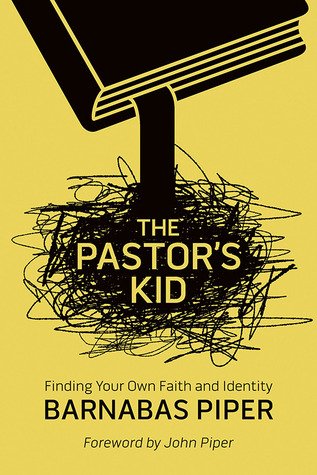A Mother’s Influence on One Pastor’s Kid: An Interview with Barnabas Piper
It has been said that pastoral ministry is not for the faint of heart. There are pressures that stretch and challenge pastors both in ministry and personally. Evidently these pressures can also spill over onto their children. At least that was the case for Barnabas Piper who wrote about them in his book The Pastor’s Kid: Finding Your Own Faith and Identity.
Barnabas (31) is the son of popular theologian, author, and speaker, John Piper. Pastor John has served in ministry in various ways but most notably as past pastor of Bethlehem Baptist Church in Minneapolis, MN where he ministered for 33 years. It is here that Barnabas derives much of his childhood memories.
But Pastor John has not served alone. Beside him, supporting and loving him along the way, has been Noel Piper, his wife of over 45 years. I asked Barnabas to tell us about his mother and how she influenced, protected, and cared for her family and specifically Barnabas as he wrestled with faith and his childhood.
Could you give us a brief synopsis for those who haven’t read your book?
The Pastor’s Kid explores the unique challenges and pressures PKs face as children of those in ministry. It comes from the perspective of PKs and addresses the pressures to be morally perfect, biblically educated, and theologically sound. It looks hard at the effect these expectations have on a PKs ability to relate to God, our parents and the church. Throughout the book, The Pastor’s Kid weaves a theme of grace and the need for it – grace to make mistakes, grace to be forgiven, grace to find a genuine identity in Jesus. It also challenges pastors and the church to make some changes and offers some concrete ways to do so. It is a direct book that seeks to expose some hard things and also offer a helpful, hope-filled alternative to them through pointing readers to Jesus.
Why did you decide to write it?
A mixture of things led me to write it, but the tipping point came when I wrote and article for Table Talk Magazine in early 2012 explaining the pressures PKs face. The writing experience took the lid off a whole can of worms in my own life and showed me how many issues were there, as a PK, that could be addressed. The responses from readers were striking in their rawness and loneliness too. It showed me that, as a whole, PKs felt isolated and nobody was addressing their needs or challenges. As I began to interact with more and more of them I realized the same threads of difficulty ran through most of their stories. So there was a need, a desire, and I had a story and the ability to write something that might help them.
Most of what I’ve read about your book and in your book focuses on your relationship with your father. But I’d like to know more about how your mother shaped your life and experience. Could you tell us about your mother, who she is and what she means to you?
This question makes me smile simply because no son can write what his mother means to him in a few short sentences. My mom is the oldest of 10 kids, raised in the strict Southern Baptist home of a small town doctor in Georgia. She is as steady as they come and a remarkably strong woman. You have to be to raise four boys in a home that in no-way resembled Lord of the Flies. And she has a big heart. When she was in her late forties the opportunity arose to adopt a baby girl, and my mom never hesitated in saying yes (credit here it’s due: my dad said yes too). So when I was 12 I got a new baby sister. Now, in her mid sixties, my mom is an empty-nester for the first time in 42 years. That is a lot of mothering.
She is brilliant (an author of two adult non-fiction books, and a handful of kids books) and taught me to love reading and stories, mostly by her example. She has an eye and heart for missions the world over, and has visited dozens of countries as part of missions trips. This also speaks to her ever-readiness to drop everything and serve. On top of all that she is eloquent and a very good teacher. Although, I didn’t appreciate that nearly as much as a child when I was home schooled for a couple years. On the one hand she set aside certain gifts and desires for a time for the good of our family – writing, traveling, raising a girl. On the other hand, she accepted the opportunities to do those things with fervor when God gave the opportunity. So she’s an example of sacrifice and stewardship, patience and action.
How did she shield you or assist you in your struggles with being a pastor’s kid?
From my perspective, the thing my mother did that was the greatest benefit to me was the constancy with which she ran our home. My father’s schedule and responsibilities as a pastor, especially as he was asked to travel more as a speaker, were rigorous. But our life kept on chugging ahead, no beats missed. For a child, to have that steadiness and regularity is a huge benefit. I recognize this much more now, as a parent myself, than I did then.
She never complained in my hearing – not ever – about my dad or about the difficulties of ministry. She didn’t bad mouth people in the church, even those who deserved it. My mom is not an emotive person, prone to expressiveness, but she is a doer, a server. She set a tone and an example in that way.
From what I’ve read, you struggled with rebellion up into your 20’s. Was your mother integral in helping you turn around?
My greatest struggles came after I was out of the house, out of college, and married. I butted heads with my mom when I was in high school and got into bits of trouble here and there, but it was when I was independent that I really made a mess of things (I tell more of that story in the book).
What my mother did for me (and Lesley, my wife) when my world was crumbling, was right in line with exactly who she was when I was growing up. She dropped everything to be there for us, she was a steady caring presence, and she showed her love for us by serving our little family (we had a toddler and an infant). She was calm in crisis and willing to be silent or offer counsel, depending on what I wanted. In short, she embodied love and care and made it known that I was her loved son regardless of my mistakes.
Does the way your mom interact with your father affect the way you think about life, love, and marriage?
Absolutely. I look at them and can’t help but admire 45+ years of marriage. That is a kind of commitment I aspire to. I admire the way she never tears my father down or undermines him. I also see some of the hard times they have been through, either that they’ve told me about or I have witnessed, and I can learn how to do some things differently from them. Neither she nor my dad are shy about telling us kids their challenges and weaknesses, and those help me recognize my own and, hopefully, learn how to overcome them in my own marriage.
How has your mother most influenced you?
She taught me to love reading which also led to my love of writing. She is insatiably curious, always learning about one thing or another – foreign countries, bird watching, heroes of hers, and so on. It set a tone of learning for me, always being interested in new knowledge. And she showed me how to be flexible and roll with life’s punches, be ready for change, and keep calm in conflict and crisis. In parenting and marriage that sort of steadiness is something I’m still learning, but her influence is priceless.
Tell us a funny story about an interaction or event you experienced with your mother.
It’s not specific to me, but when my three older brothers and I were little, my mom was on a first name basis with the urgent care nurses. We visited the office so many times with broken bones, gashes, busted lips, concussions, and so forth. Being the trooper she was, my mom would wrap us up, buckle us in, and drive on over to urgent care all in a day’s work. She would walk in with one of us busted up and bleeding and they’d say “Oh hi, Noel. What happened to the boys this time?” I suspect she was mildly relieved that my sister didn’t necessitate the same number of visits.
If you could speak with pastor’s kids, what would you say to them in regards to the role of a pastor’s wife?
I would tell them that their mom probably understands the pressure they’re under more than they think. I didn’t realize this growing up. I would encourage PKs to confide in their moms more about the challenges and pressures they face. I didn’t ever really do this, and I wish I had tried. I think one of the biggest things many PKs lack is someone who understands, especially in the safety of their home. It is a scary thing to tell your parents that you don’t always like church or that you have doubts about faith or that you’re sick of the pressure. It feels like you’re challenging their very identity or even challenging God sometimes. But an understanding mom will be able to take that in stride and likely help a lot.
For more information about Barnabas Piper visit his website at www.barnabaspiper.com.
RELATED CONTENT


